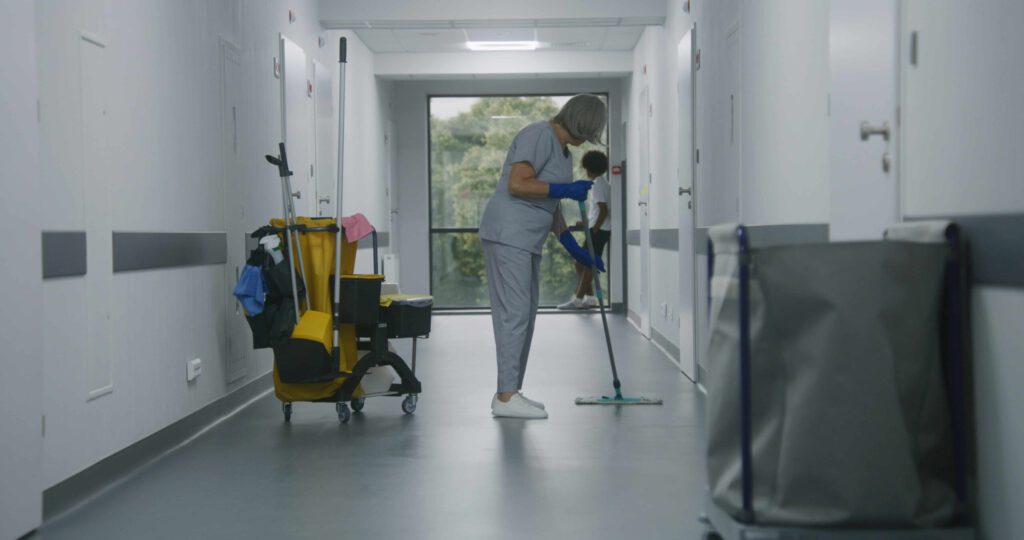Improving Patient Experience With Regular Cleaning In Healthcare Environments
Posted by platform81 on May 26, 2023
In healthcare facilities, patient experience and safety are of utmost importance. From hospitals and clinics to nursing homes and outpatient centres, maintaining a clean and hygienic medical environment is crucial for the well-being of patients and staff alike. This blog will explore the significance of regular cleaning in healthcare environments and its relationship to patient experience and safety.
Why is regular cleaning in healthcare environments necessary?
Healthcare facility cleaning is not a mere aesthetic concern; it directly impacts patient health. Clean and well-maintained environments reduce the risk of healthcare-associated infections (HAIs) and other preventable diseases. Infection control cleaning guidelines, set by organisations like the Centres for Disease Control and Prevention (CDC), emphasise the importance of regular cleaning routines to prevent the spread of pathogens and maintain a safe healthcare setting.
How can cleaning impact patient safety and experiences?
Enhancing patient experience is another crucial aspect of healthcare facility cleaning. Patients often associate cleanliness and hygiene with the quality of care they receive. A clean and well-organised facility instils confidence in patients, making them feel more comfortable and reassured during their stay. It can positively impact their overall perception of the healthcare facility, improving patient outcomes and satisfaction.
How does cleaning vary for different healthcare facilities?

Different types of healthcare facilities require specific cleaning practices to meet their unique needs. For example:
1. Hospitals
Hospitals, being the most complex healthcare environments, demand rigorous cleaning protocols due to the high volume of patients and the diverse range of services provided. Regular cleaning of patient rooms, waiting areas, operating rooms, and common areas is essential to maintain hygiene and prevent the spread of infections. Special attention is given to high-touch surfaces, such as doorknobs, handrails, and bedside tables, to minimise the risk of cross-contamination.
2. Clinics and outpatient centres
Clinics and outpatient centres, while often smaller than hospitals, still require diligent cleaning practices. These facilities often serve patients with chronic illnesses or those seeking specialised care. Regular cleaning of examination rooms, waiting areas, and equipment ensure a clean and welcoming environment for patients. Additionally, the proper disposal of medical waste, including sharps containers and biohazardous materials, is vital to prevent any potential health risks.
3. Nursing homes
Nursing homes and long-term care facilities cater to elderly and vulnerable individuals, requiring specific attention to cleanliness and infection control. Regular cleaning and disinfection of resident rooms, communal areas, dining halls, and bathrooms are essential to maintain a safe and healthy living environment. Thorough cleaning of medical equipment, such as wheelchairs and walkers, is also crucial to prevent the spread of infections among residents.
Trust ServiceMaster With Contract Medical Cleaning Services in Manchester
Compliance with cleaning standards and guidelines set by regulatory bodies, such as the Care Quality Commission (CQC), is paramount in healthcare settings. CQC-compliant medical cleaning companies like ServiceMaster Manchester ensure that healthcare facilities adhere to healthcare cleaning practices and follow stringent cleanliness standards, providing patients with the highest level of care and safety. Regular audits and inspections ensure that these standards are consistently met, maintaining a clean and infection-free environment.
If you’d like to learn more about commercial healthcare facility cleaning across Greater Manchester, get in touch with ServiceMaster Manchester today!
For other commercial cleaning concerns, we also offer contract cleaning services for schools and a range of other commercial properties. Don’t hesitate to get in touch to receive a free, no-obligation cleaning contract quote